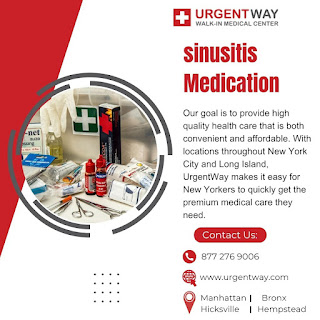What new treatments or medications are currently being researched for sinusitis?
What new treatments or medications are currently being researched for sinusitis?
Introduction:
The
inflammation of the sinuses, which are air-filled canals in the skull, is the
hallmark of sinusitis, commonly referred to as a sinus infection. There are
several symptoms that might result from this inflammation, such as headaches,
face pain, congestion in the nose, and diminished sense of smell. There are two
types of sinusitis: acute, which goes away quickly, and chronic, which stays untreated
for more than 12 weeks.
Conventional therapies for sinusitis consist of prescription antibiotics, nasal
corticosteroids, over-the-counter decongestants and antihistamines, and
occasionally surgery. But not all patients respond well to these medications,
particularly those who have persistent sinusitis. Because of this, scientists
are always looking into novel approaches to treating sinusitis and enhancing
the quality of life for those who suffer from it. This article will explore
Prior to
investigating novel therapies, it's critical to comprehend the fundamental
reasons and difficulties of sinusitis. A number of things can cause sinusitis,
such as:
Viral Infections: Acute sinusitis is mostly caused by viruses, which
frequently develop after a common cold.
Bacterial Infections: Bacterial infections may be involved in cases of severe
or protracted sinusitis.
Fungal Infections: While less frequent, fungal sinusitis can happen,
especially in those with compromised immune systems.
Allergies: Reactions to allergens can inflame the nasal passages, which
can result in sinusitis.
Nasal polyps: These benign growths within the nasal cavity have the
ability to obstruct the sinuses and aggravate chronic sinusitis.
Deviated Septum: Recurrent infections and sinus blockage can result from
a deviation in the nasal septum.
Antibiotic
resistance, the intricacy of chronic sinusitis, and the limitations of current
treatments are some of the reasons why treating sinusitis properly is still
difficult, despite its wide range of causes. In an effort to address the
underlying reasons and enhance patient outcomes, this has led researchers to
investigate novel therapy options.
Novel Remedies and Drugs for Sinusitis:
1. Biologics
A family of drugs known as biologics targets particular immune system
components that contribute to inflammation. These drugs have demonstrated
potential in the treatment of chronic sinusitis, especially in those with nasal
polyps or in patients who do not react well to standard therapies.
Dupilumab.
The interleukin-4 receptor alpha (IL-4Rα) is the target of the monoclonal
antibody dupilumab, which is approved to treat chronic rhinosinusitis with
nasal polyps (CRSwNP). Dupilumab dramatically reduces nasal polyp size,
improves nasal congestion, and improves the sense of smell by blocking the
signaling pathways of IL-4 and IL-13, which are important drivers of inflammation
in CRSwNP.
Investigations and Clinical Trials.
Dupilumab has been shown in recent clinical trials to be effective in
decreasing nasal polyp size and enhancing patients' quality of life who have
CRSwNP. In a phase 3 trial, nasal polyp size and nasal congestion were
significantly reduced in patients treated with dupilumab as compared to
placebo. Dupilumab has also been shown to lessen the requirement for sinus
surgery and systemic corticosteroids in CRSwNP patients.
Omalizumab.
Another biologic that targets the antibody immunoglobulin E (IgE), which is
implicated in allergic responses, is omalizumab. Currently, chronic idiopathic
urticaria and allergic asthma are the conditions for which it is approved. Its
potential for treating CRSwNP has been investigated recently, especially in
patients who also have allergies and asthma.
Investigations and Clinical Trials
Promising outcomes were observed in a randomised controlled trial examining the
effectiveness of omalizumab in patients with CRSwNP. Omalizumab patients saw
notable reductions in nasal congestion, enlarged polyps, and improved overall
quality of life. These results imply that omalizumab could be a useful
therapeutic option for CRSwNP patients, particularly those with underlying
allergy disorders.
2. Topical
Treatments
Topical treatments seek to maximize effectiveness while reducing systemic side
effects by administering medication directly to the sinusitis site. Research on
a number of novel topical therapies for sinusitis is under underway.
Solutions for Releasing Nitric Oxide
One chemical that has antibacterial and anti-inflammatory qualities is nitric
oxide (NO). NO-releasing solutions are being studied as a topical therapy for
sinusitis that addresses inflammation and bacterial infections.
Investigations
and Clinical Trials
Preclinical research has shown that NO has antibacterial action against typical
sinusitis-causing bacterial infections. Furthermore, NO has been demonstrated
to lessen sinus inflammation and encourage mucociliary clearance. To assess the
effectiveness and safety of NO-releasing treatments in individuals with
persistent sinusitis, clinical trials are being conducted.
Nasal Spray with Ciprofloxacin
A popular broad-spectrum antibiotic for treating bacterial infections is
ciprofloxacin. With the goal of delivering high concentrations of the
antibiotic straight to the sinuses, researchers are investigating the use of
ciprofloxacin nasal spray as a topical treatment for chronic sinusitis.
Sinus Infection
doctor At UrgentWay Walk-In Clinic:
Sinus infectiontreatment is availa
ble at all UrgentWay locations. We are open seven days a week from morning to evening, giving you the freedom to visit us whenever it is convenient. Our experienced providers will assess your condition, advise the best sinus infection treatment accordingly and counsel you on preventative care.
Conclusion:
Treatment for sinusitis is still difficult, especially if the problem is
chronic or if conventional methods don't work. Ongoing studies and developments
in medicine, however, give hope for more precise and effective treatments down
the road. Numerous novel treatments and drugs are now being investigated,
ranging from revolutionary surgical procedures and complementary therapies to
biologics and novel antimicrobials.
.png)



Comments
Post a Comment